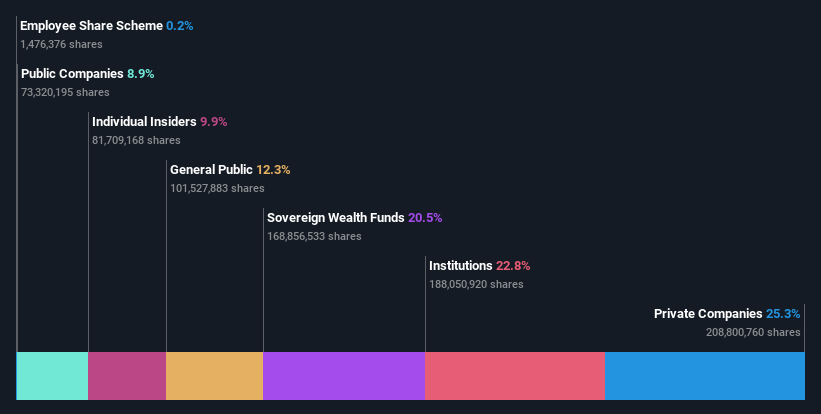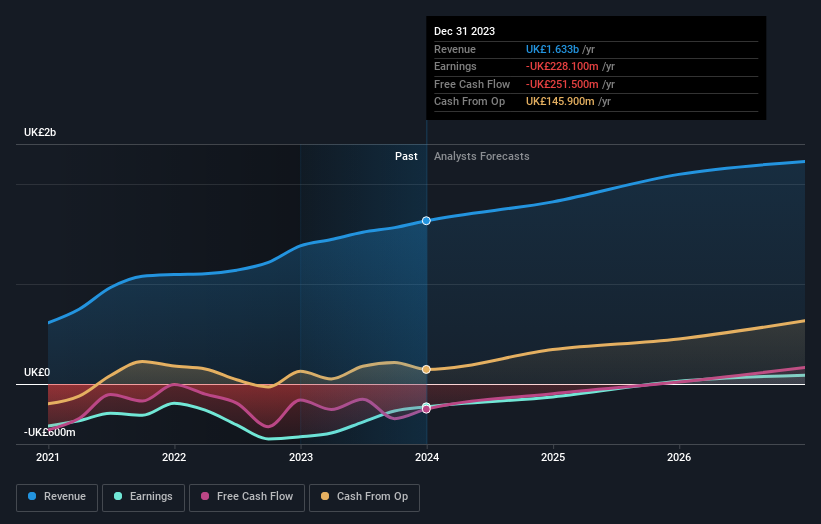Aston Martin Lagonda Global Holdings plc's (LON:AML) largest shareholders are private companies with 25% ownership, institutions own 23%
Key Insights
Aston Martin Lagonda Global Holdings' significant private companies ownership suggests that the key decisions are influenced by shareholders from the larger public
A total of 4 investors have a majority stake in the company with 54% ownership
Institutions own 23% of Aston Martin Lagonda Global Holdings
Every investor in Aston Martin Lagonda Global Holdings plc (LON:AML) should be aware of the most powerful shareholder groups. The group holding the most number of shares in the company, around 25% to be precise, is private companies. Put another way, the group faces the maximum upside potential (or downside risk).
And institutions on the other hand have a 23% ownership in the company. Generally speaking, as a company grows, institutions will increase their ownership. Conversely, insiders often decrease their ownership over time.
Let's take a closer look to see what the different types of shareholders can tell us about Aston Martin Lagonda Global Holdings.
View our latest analysis for Aston Martin Lagonda Global Holdings
What Does The Institutional Ownership Tell Us About Aston Martin Lagonda Global Holdings?
Institutions typically measure themselves against a benchmark when reporting to their own investors, so they often become more enthusiastic about a stock once it's included in a major index. We would expect most companies to have some institutions on the register, especially if they are growing.
As you can see, institutional investors have a fair amount of stake in Aston Martin Lagonda Global Holdings. This implies the analysts working for those institutions have looked at the stock and they like it. But just like anyone else, they could be wrong. If multiple institutions change their view on a stock at the same time, you could see the share price drop fast. It's therefore worth looking at Aston Martin Lagonda Global Holdings' earnings history below. Of course, the future is what really matters.
We note that hedge funds don't have a meaningful investment in Aston Martin Lagonda Global Holdings. Our data shows that Public Investment Fund is the largest shareholder with 20% of shares outstanding. In comparison, the second and third largest shareholders hold about 15% and 9.8% of the stock. Lawrence Stroll, who is the third-largest shareholder, also happens to hold the title of Chairman of the Board.
Our research also brought to light the fact that roughly 54% of the company is controlled by the top 4 shareholders suggesting that these owners wield significant influence on the business.
Researching institutional ownership is a good way to gauge and filter a stock's expected performance. The same can be achieved by studying analyst sentiments. There are plenty of analysts covering the stock, so it might be worth seeing what they are forecasting, too.
Insider Ownership Of Aston Martin Lagonda Global Holdings
While the precise definition of an insider can be subjective, almost everyone considers board members to be insiders. Management ultimately answers to the board. However, it is not uncommon for managers to be executive board members, especially if they are a founder or the CEO.
I generally consider insider ownership to be a good thing. However, on some occasions it makes it more difficult for other shareholders to hold the board accountable for decisions.
We can see that insiders own shares in Aston Martin Lagonda Global Holdings plc. It is a pretty big company, so it is generally a positive to see some potentially meaningful alignment. In this case, they own around UK£124m worth of shares (at current prices). Most would say this shows alignment of interests between shareholders and the board. Still, it might be worth checking if those insiders have been selling.
General Public Ownership
The general public-- including retail investors -- own 12% stake in the company, and hence can't easily be ignored. While this group can't necessarily call the shots, it can certainly have a real influence on how the company is run.
Private Company Ownership
It seems that Private Companies own 25%, of the Aston Martin Lagonda Global Holdings stock. Private companies may be related parties. Sometimes insiders have an interest in a public company through a holding in a private company, rather than in their own capacity as an individual. While it's hard to draw any broad stroke conclusions, it is worth noting as an area for further research.
Public Company Ownership
Public companies currently own 8.9% of Aston Martin Lagonda Global Holdings stock. We can't be certain but it is quite possible this is a strategic stake. The businesses may be similar, or work together.
Next Steps:
It's always worth thinking about the different groups who own shares in a company. But to understand Aston Martin Lagonda Global Holdings better, we need to consider many other factors. To that end, you should be aware of the 1 warning sign we've spotted with Aston Martin Lagonda Global Holdings .
But ultimately it is the future, not the past, that will determine how well the owners of this business will do. Therefore we think it advisable to take a look at this free report showing whether analysts are predicting a brighter future.
NB: Figures in this article are calculated using data from the last twelve months, which refer to the 12-month period ending on the last date of the month the financial statement is dated. This may not be consistent with full year annual report figures.
Have feedback on this article? Concerned about the content? Get in touch with us directly. Alternatively, email editorial-team (at) simplywallst.com.
This article by Simply Wall St is general in nature. We provide commentary based on historical data and analyst forecasts only using an unbiased methodology and our articles are not intended to be financial advice. It does not constitute a recommendation to buy or sell any stock, and does not take account of your objectives, or your financial situation. We aim to bring you long-term focused analysis driven by fundamental data. Note that our analysis may not factor in the latest price-sensitive company announcements or qualitative material. Simply Wall St has no position in any stocks mentioned.

 Yahoo Finance
Yahoo Finance 

